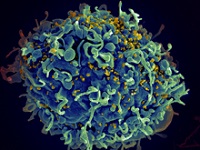 |
| HIV particles infecting a human T cell--Courtesy of NIAID/NIH |
HIV/AIDS prevention can be difficult in countries with limited resources, especially when it comes to the millions of affected children who are less likely to tolerate antiretroviral drugs. In an effort to overcome this challenge, researchers at Penn State University have developed a delivery system for the antiretroviral Ritonavir that uses a protein in cow's milk for oral administration of the drug.
Ritonavir is one of the most commonly prescribed antiretroviral drugs for the prevention of HIV infection, but it comes with a host of problems, including a bevy of side effects and poor solubility in water, which contributes to issues in oral delivery. According to lead researcher Federico Harte, the drug interacts with the gastrointestinal fluid with poor bioavailability and causes nausea, vomiting and diarrhea, not to mention its strong flavor.
So Harte and his team looked at casein proteins, which are found in cow's milk and naturally carry amino acids and calcium, making them ideal for delivering treatments like Ritonavir in a more tolerable form, according to the study published in the Journal of Pharmaceutical Research.
"I have been working with bovine casein micelles for a few years now, and we have investigated the structure and functionality of these proteins," Harte said in a statement. "What we found is these micelles are able to carry molecules that have very little solubility in water, that have low molecular weight and that are very hydrophobic--such as Ritonavir."
To alter the proteins, the team homogenized the milk at ultrahigh pressure, enhancing the casein micelles and making them more suitable for carrying the drug.
"As a result of this enhanced binding of molecules, we believe a milk powder containing Ritonavir can be used as baby formula, providing a transport system for a drug that is not very soluble in water," Harte said. "Right now we are running tests, and we are in the final stages of an experiment in which we gave three different formulations to piglets."
Harte and his team are working with the National Institutes of Health and St. Jude Children's Research Hospital to move the experiments into clinical trials.
- here's the Penn State report